[Un]classes
A community-engaged learning model for Akron
[Un]classes break the mold of a traditional class by being unscripted, transdisciplinary, community-engaged courses that lead to real-world impact. They provide a uniquely Akron way to investigate topics of local relevance, generate meaningful solutions, and learn alongside community experts. Faculty and students work closely together to craft the class and students have a voice in the course design, topics of study, and projects. [Un]classes offer an opportunity to connect fields of study to real-world issues participants feel passionate about.
In an [Un]class, students will exercise creative imagination and problem-solving skills, demonstrate growth through self-discovery, learn about local issues, and connect to Akron communities.
75
[Un]classes offered since 2016
79
Unique [Un]class instructors
800+
University of Akron students reached
How to register for [Un]classes
A step-by-step guide about how to find classes, sign up and more through Workday.

94%
experienced growth in or applied their skills in creative/innovative thinking from [Un]class

87%
agree/strongly agree that the [Un]class strengthened their connection to the community/city of Akron
80%
agree/strongly agree the [Un]class increased their connection to UA
Spring 2026 [Un]classes
THE ART AND SCIENCE OF SCIENCE COMMUNICATION
BIOL: 495-003
M | 12:55 - 3:25 PM
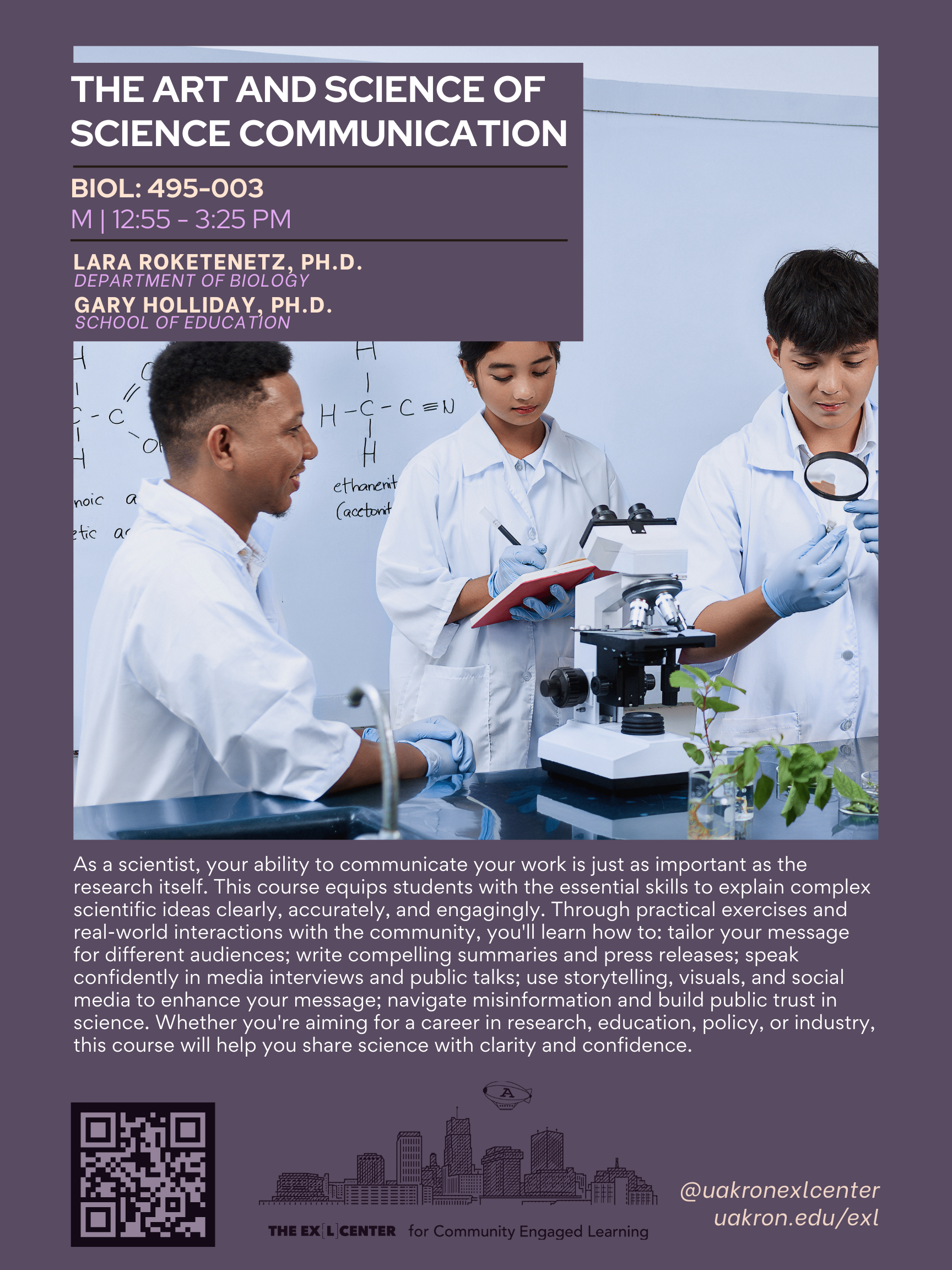
Lara Roketenetz, Ph.D.
Department of Biology
Gary Holliday, Ph.D.
School of Education
As a scientist, your ability to communicate your work is just as important as the research itself. This course equips students with the essential skills to explain complex scientific ideas clearly, accurately, and engagingly. Through practical exercises and real-world interactions with the community, you'll learn how to: tailor your message for different audiences; write compelling summaries and press releases; speak confidently in media interviews and public talks; use storytelling, visuals, and social media to enhance your message; navigate misinformation and build public trust in science. Whether you're aiming for a career in research, education, policy, or industry, this course will help you share science with clarity and confidence.
SECURING THE POUND
Public Safety at the Browns Berea Campus
EMHS 490 / CRJU 480-001 Special Topics
W | 1:00 - 4:00 PM
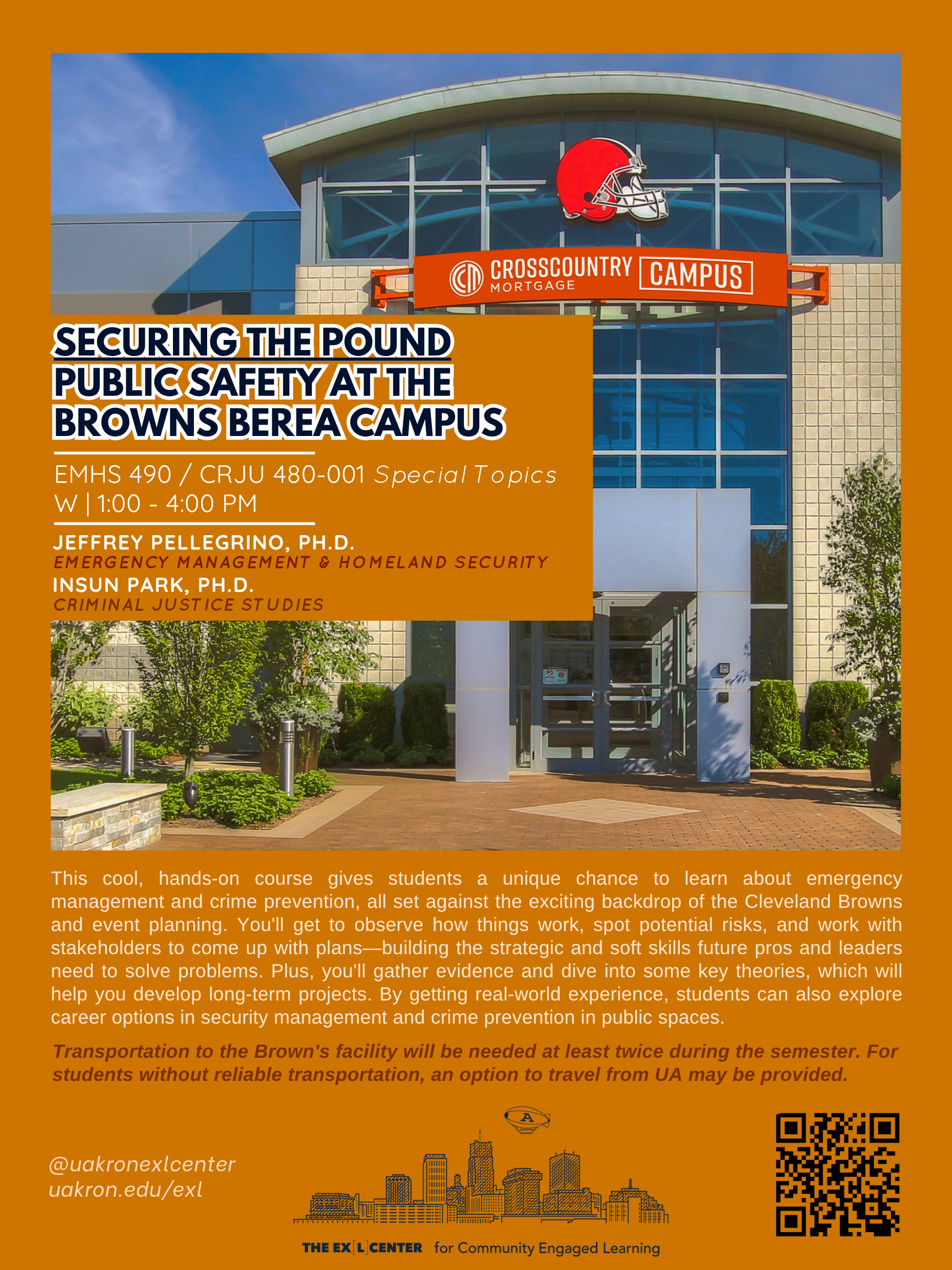
Jeffrey Pellegrino, Ph.D.
Emergency Management & Homeland Security
Insun Park, Ph.D.
Criminal Justice Studies
This cool, hands-on course gives students a unique chance to learn about emergency management and crime prevention, all set against the exciting backdrop of the Cleveland Browns and event planning. You'll get to observe how things work, spot potential risks, and work with stakeholders to come up with plans—building the strategic and soft skills future pros and leaders need to solve problems. Plus, you'll gather evidence and dive into some key theories, which will help you develop long-term projects. By getting real-world experience, students can also explore career options in security management and crime prevention in public spaces.
Transportation to the Brown's facility will be needed at least twice during the semester.
For students without reliable transportation, an option to travel from UA may be provided.
TODAY AT I PROMISE
Participatory Journalism
COMM 450
T/Th | 9:15-10:45 AM
Most classes held at I Promise
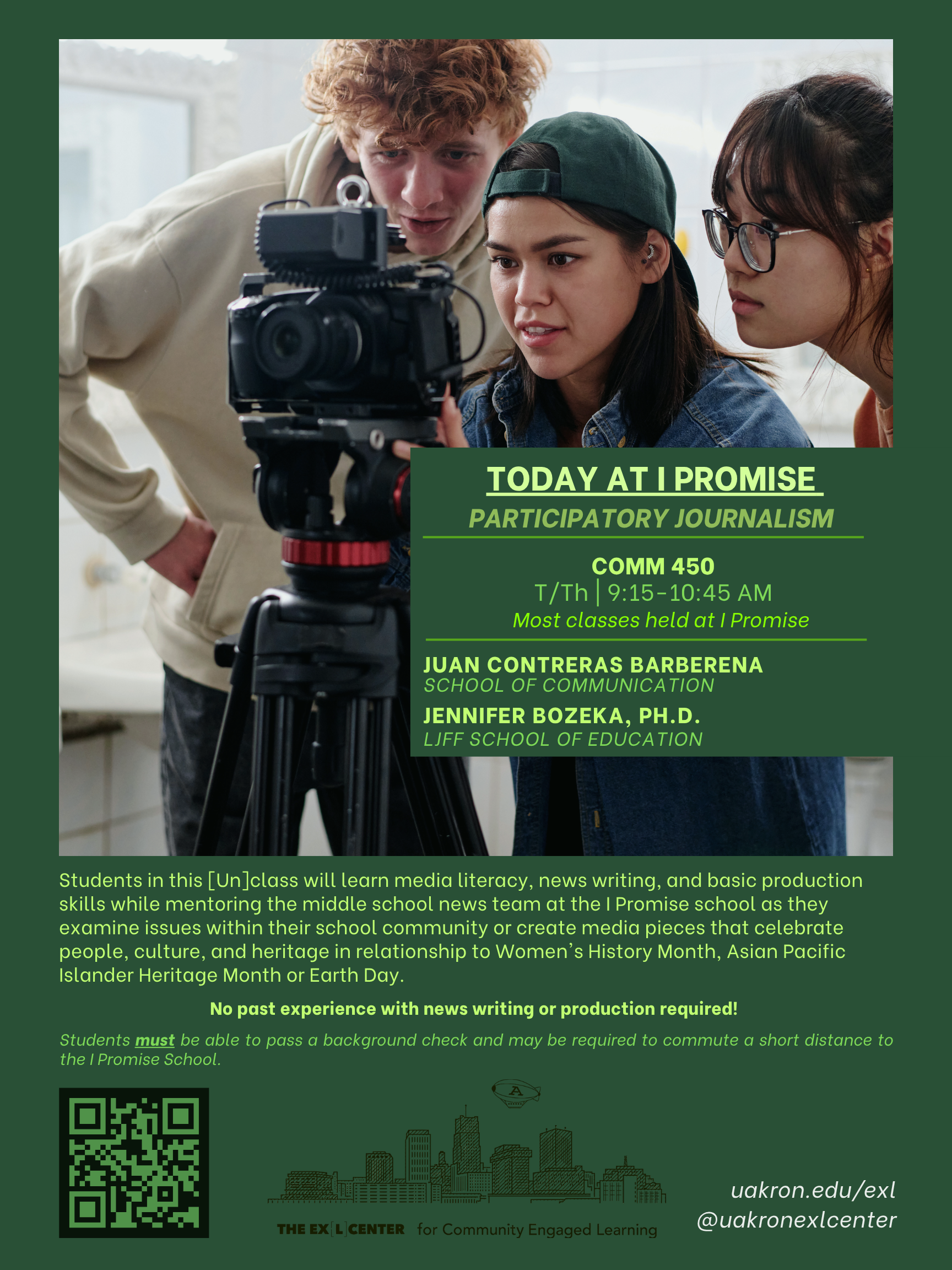
Juan Contreras Barberena
School of Communication
Jennifer Bozeka, Ph.D.
LJFF School of Education
Students in this [Un]class will learn media literacy, news writing, and basic production skills while mentoring the middle school news team at the I Promise school as they examine issues within their school community or create media pieces that celebrate people, culture, and heritage in relationship to Women's History Month, Asian Pacific Islander Heritage Month or Earth Day.
No past experience with news writing or production required!
Students must be able to pass a background check and may be required to commute a short distance to the I Promise School.
UNSETTLING THE MUSEUM
The [Un]exhibit
IHSC:445/545 | ENGL:489/589
T | 5:10-7:40 PM
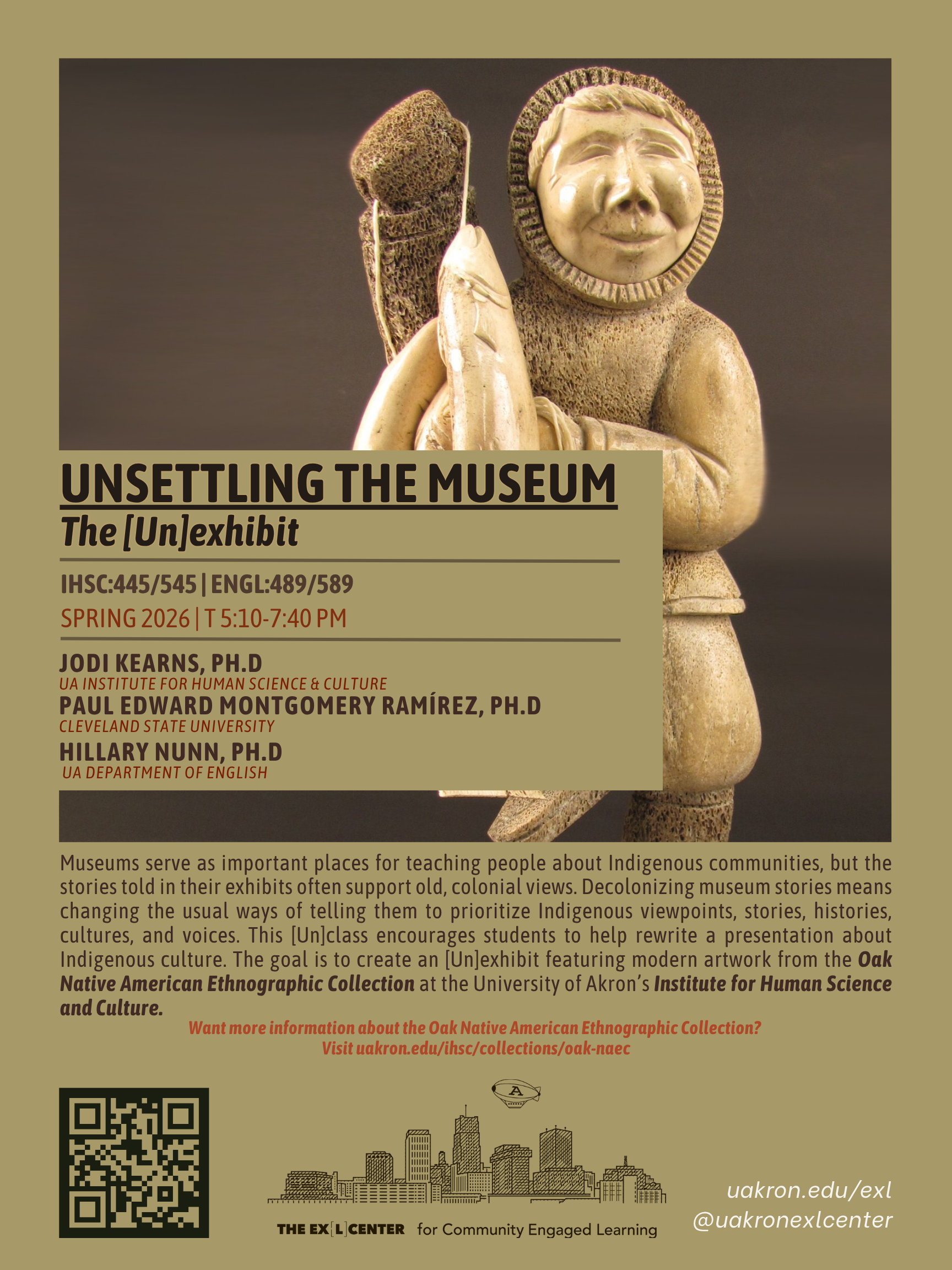
Jodi Kearns, Ph.D.
UA Institute for Human Science & Culture
Paul Edward Montgomery Ramírez, Ph.D.
Cleveland State University
Hillary Nunn, Ph.D.
UA Department of English
Museums serve as important places for teaching people about Indigenous communities, but the stories told in their exhibits often support old, colonial views. Decolonizing museum stories means changing the usual ways of telling them to prioritize Indigenous viewpoints, stories, histories, cultures, and voices. This [Un]class encourages students to help rewrite a presentation about Indigenous culture. The goal is to create an [Un]exhibit featuring modern artwork from the Oak Native American Ethnographic Collection at the University of Akron’s Institute for Human Science and Culture.
Want more information about the Oak Native American Ethnographic Collection?
Visit uakron.edu/ihsc/collections/oak-naec
THE WEIGHT OF WASTE
Community Conflict and Environmental Health in Akron
COMM 444-001 Communication and Conflict
T/TH | 10:45AM – 12:00PM
Kolbe Hall Room 227
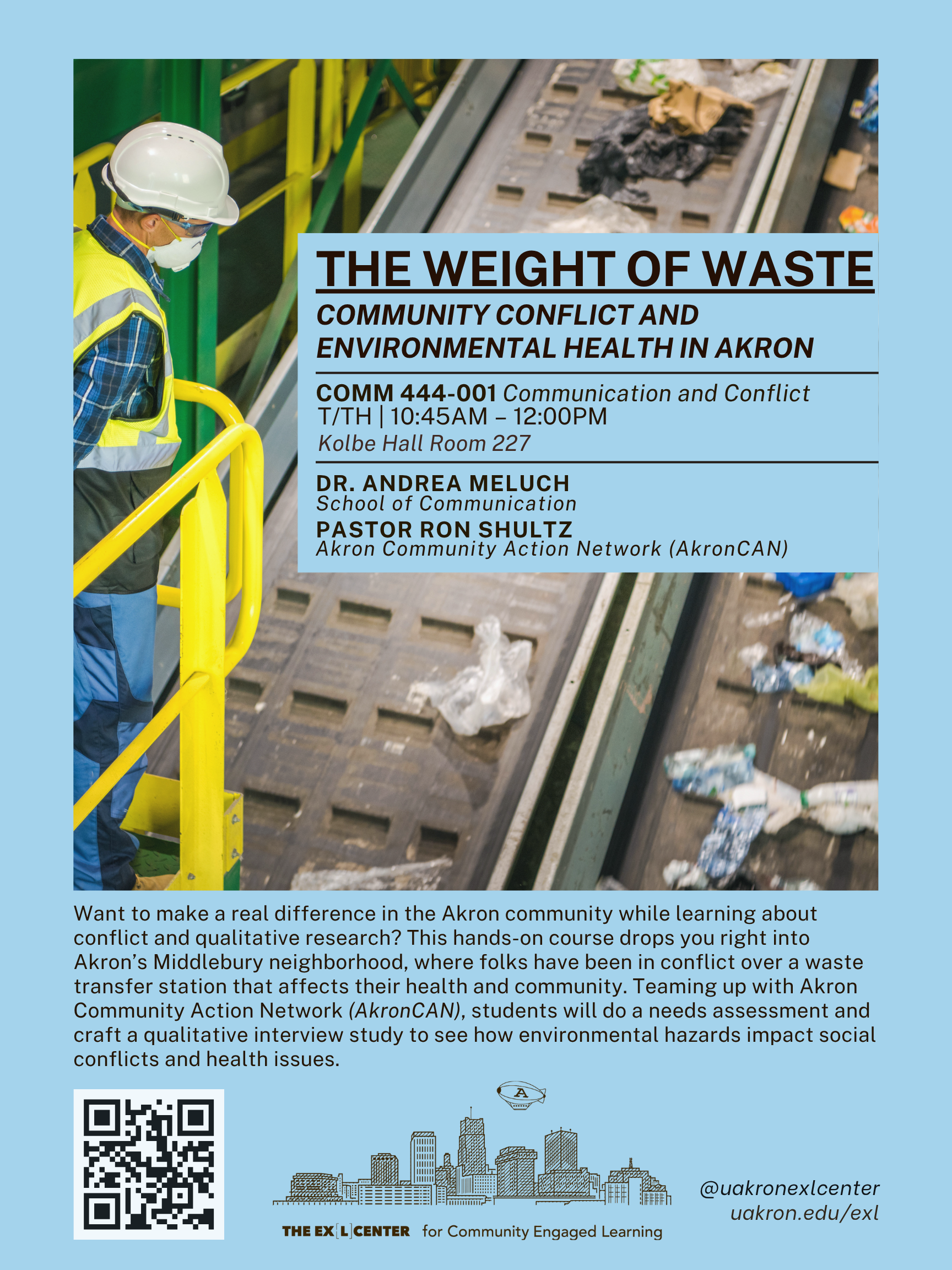
Andrea Meluch, Ph.D.
School of Communication
Pastor Ron Shultz
Akron Community Action Network (AkronCAN)
Want to make a real difference in the Akron community while learning about conflict and qualitative research? This hands-on course drops you right into Akron’s Middlebury neighborhood, where folks have been in conflict over a waste transfer station that affects their health and community. Teaming up with Akron Community Action Network (AkronCAN), students will do a needs assessment and craft a qualitative interview study to see how environmental hazards impact social conflicts and health issues.
Want to teach [Un]class? Email exl@uakron.edu with your ideas!
![EX[L] Center For Community Engaged Learning](/application/themes/uakron-2/images/stacked-ua.svg)